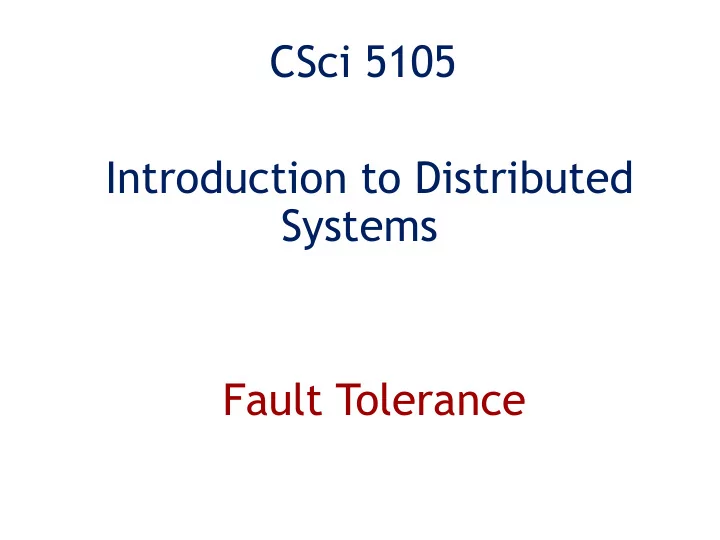

CSci 5105 Introduction to Distributed Systems Fault Tolerance
Last Time • Replication and Consistency
Today • Fault tolerance • Chapter 8 TVS
Fault Tolerance Basics • Availability – short time horizon – e.g down 1 msec every hour => 99.9999 avail • Reliability – over longer time horizon – e.g. but not that reliable, no job can run > 1 hr • Safety: temporary failure # catastrophe • Maintainability: ease of repair
Brewer Avail
More Definition • Fail: cannot meet promises • Error: system state may => failure • Fault: cause of an error • Tolerate faults => operate correctly • Fault types – Transient, intermittent, permanent
Failure Models • Figure 8-1. Different types of failures. byzantine
Failure Types • fail-stop ~ crash failure – failed process stops producing output; easily detected as failed without ambiguity – machine on my local network • fail-silent – failure not so obvious: really slow or failed? – remote communicating process • fail-safe – arbitrary failures that are recognized as such
RPC Failures 1. The client is unable to locate the server – raise exception 2. The req. message from the client to the server is lost 3. The server crashes after receiving a request 4. The reply message to the client is lost 2-4 Detect via time-out; take action (retransmit or not) The client crashes after sending a request – orphan – problem?
Failure Masking by Redundancy • Figure 8-2. Triple modular redundancy. Classic TMR: throwing hardware at the problem Assumptions?
Process Failures • Process replication or groups • Need to have group consensus • Group can change: group management becomes key • Compare? ~ primary backup
Failure Masking + Replication • General groups – K fault tolerant (K failaures) • fail-stop/fail-silent => • byzantine failures =>
Agreement in Faulty Systems • Examples – voting, leader election, multicast • Reliable multicast – group is fixed – failure reported via feedback
Feedback Control • Missing a message can unicast or multicast • K missing: K unicasts or multicasts • Latter: nice optimization – delay a little before requesting retransmission – another node may do it – So maybe 1 retransmitted multicast will suffice
Atomic Multicast • Reliable multicast and ordering • Everyone sees same message order or none • Eg. Consistency => DB updates • Problem: group members come and go • Agree who is in the group – View synchronous
Virtual Synchrony • Group view – When message M is sent; everyone agrees who is in the group – If group state changes during M • M delivered to all before group change or to none • This is known as virtual synchrony
Virtual Synchrony
Multicast Message Ordering • Unordered multicasts • FIFO-ordered multicasts • Easy: issue message in sequence order • Causally-ordered multicasts • Harder: need vector time-stamps • Totally-ordered multicasts • Need a global sequencer • Each multicast message is given a global #: 1, 2, 3, …
Message Ordering • What ordering do these satisfy?
Two-Phase Commit (2PC) • Send message and have everyone either act on message or not • Typical action: commit a transaction • Multi-step – Vote-request – Vote-commit or vote-abort – Global-commit or global-abort • Impressions?
Two-Phase Commit (2PC) Coordinator participant • Distributed commit – all or none
What about failure? • Coordinator failure • Node P in READY state and times out • Asks node Q
2PC Failure/Recovery • Nodes fail and may recover • Use logging . . .
2PC Failure/Recovery (cont’d) . . .
2PC: Participant recovery
2PC: Participant recovery (cont’d) • Used to help other participants
Next Time • Byzantine Agreement and Recovery • Read Chapter 8 TVS and FT* paper
Recommend
More recommend